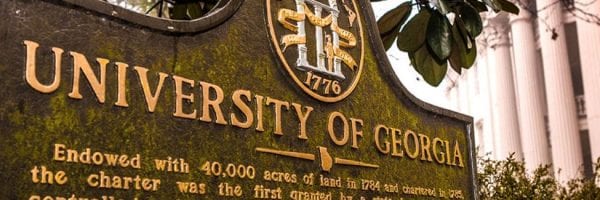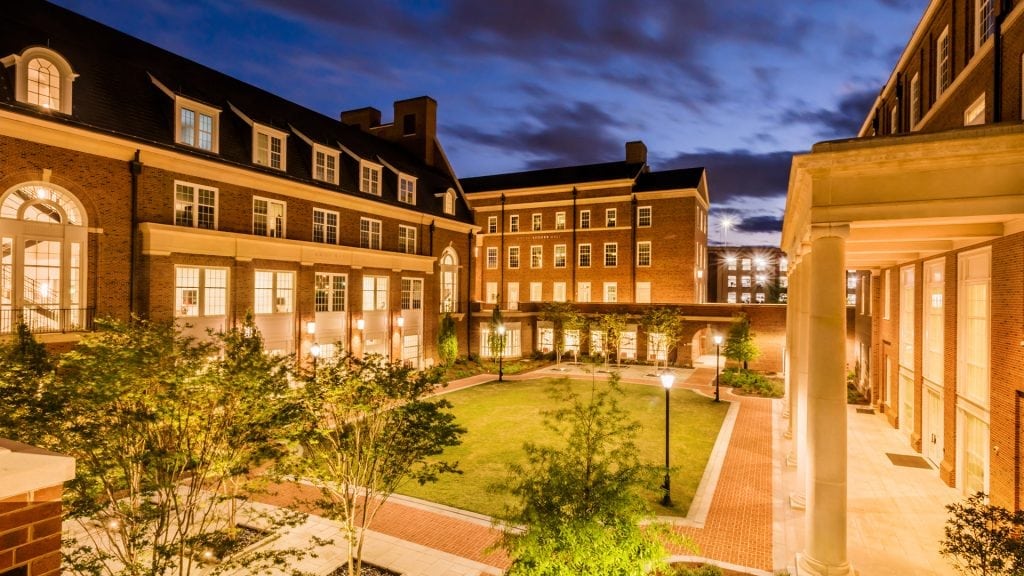No GMAT? Check Out Some of Our Favorites Schools that Offer Waivers

Applying to MBA programs can be a labor intensive and overwhelming task, and one may wonder how necessary it is to add the GMAT to an already lengthy to-do list. It’s important to note that the GMAT helps admissions boards to efficiently gauge a student’s overall readiness for the MBA in comparison to other applicants, regardless of the rigor of their undergraduate work. Also, b-schools use the average GMAT of successful applicants in order to bolster their rankings in certain publications. Some programs do, however, accept GMAT waivers.
Here is a look at some top schools that do not require GMAT scores, along with a summary of their waiver requirements.
The Rutgers Business School offers MBA students to forego the GMAT or GRE if they have eight or more years of professional experience and an undergraduate GPA of 3.0 or higher. Students with a Master’s degree and at least five years of full-time work experience may also apply without taking the GMAT.
La Salle University has several possibilities for students who have not taken the GMAT. Potential MBAs can obtain a waiver if they have graduated from an AACSB-accredited school with a minimum cumulative GPA of 3.2; a minimum GPA of 3.0; and three years of work experience. La Salle’s MBA program director evaluates each applicant’s work experience to determine whether the waiver may be granted.
Applicants with a CPA license or a CFA Charter may also apply without the GMAT, as may those with a Ph.D. or a Master’s degree or higher from an accredited institution. A cumulative GPA of 3.0 or higher is required for applicants with a Master’s degree.
LaSalle also has a ‘qualified admission’ option in which a student with two years’ work experience and a GPA of 3.0 or higher from an accredited school can waive the GMAT requirement. Qualified students may take up to four MBA courses, and with an overall GPA of 3.3, will not be required to take the GMAT. ‘Conditional Acceptance’ is also an option, in which a limited number of students are admitted for one semester, but then must take the test in order to remain enrolled and gain financial aid eligibility.

University of Delaware’s Lerner College of Business and Economics gives waivers to MBA students if they possess a terminal degree (Ph.D., MD, or JD, for example) or if they have four or more years of professional experience at the full-time level. Other conditions under which a student may apply with no GMAT are a minimum undergraduate GPA of 2.8; a minimum grade of ‘B’ in two non-introductory level statistics or calculus courses; and an acceptable level of writing ability and English proficiency.
Lerner also grants exceptions to the GMAT requirement for undergraduates of the school who have fewer of four years of work experience and a GPA of 3.0 or higher, in addition to ‘B’ grades or better in 200 level statistics or math courses.

The Pace University Lubin School of Business MBA admissions board considers waivers of GMAT scores for students with a 3.2 GPA or above for all undergraduate coursework. For those applying to the one year fast track MBA in Financial Management or Marketing Management, applicants need a cumulative GPA of 3.3 or above and a B grade or better in all undergraduate business courses.

Babson College’s F.W. Olin College of Business offers GMAT waivers to all applicants to the Blended Learning MBA program, as students applying to this track are required to have extensive work experience. Additionally, those applying to Babson’s evening MBA do not have to submit GMAT scores in certain circumstances, such as a grade of ‘B’ or better in two or more quantitative undergrad and/or graduate courses or exhibited quantitative and analytic skills in a work setting.
Babson evening MBA applicants who have a professional certificate with a quantitative focus such as a CPA or CFA may also apply without taking the GMAT. Other instances in which evening MBAs may apply without the test are a 3.0 GPA or greater throughout their undergrad degrees, a prior degree from Babson, or completion of Babson’s Certificate in Advanced Management (CAM) program.

The GMAT requirement may also be waived at DePaul University’s Kellstadt Graduate School of Business if an applicant meets some specific criteria. With a bachelor’s degree from an accredited university along with five years of work experience, a student may petition for a waiver. Work experience must include both management and quantitative responsibilities.
Like other programs mentioned above, the GMAT may not be required if a student already has a PhD, JD or MD, or a Master’s degree in finance. An LSAT score of 160 or higher along with an undergraduate degree, or completion of all parts of the PE exam may also exempt an applicant from the GMAT requirement.
Students applying to the part-time MBA program who have attended DePaul’s Driehaus College of Business for their undergraduate work may receive a waiver with a minimum GPA of 3.2 and at least two years of work experience.

Suffolk University’s Sawyer School of Business allows students who have taken the CPA exam to request a waiver, and also those who have taken the first level of either the CFA or the FRM exams. Second semester seniors and undergraduate business students applying for an MBA may waive the GMAT with a cumulative GPA of 3.3 or greater.
Students with work experience and certain GPA requirements may waive the GMAT; those who have worked for two years in a relevant position with an average grade point of 3.4 may request a waiver, as can those who have four years of work experience and a 3.3 GPA. With six years of work experience and at least a 3.2 GPA, an applicant may also waive the submission.
Law school graduates (from ABA approved schools), along with MSA, MSF, MSBA or MST from an AACSB approved institution are eligible for waivers. Sawyer allows MBA applicants who are in their second senior semester of undergraduate music management at Berklee College to request a GMAT waiver as well, provided the student maintains a 3.3 minimum GPA. Recent Berklee graduates may also request exemption from the GMAT requirement.

Golden Gate University’s Edward S. Ageno School of Business has several options for students who wish to apply without the GMAT. Those with a Master’s degree or higher from any accredited US institution may be exempt, along with any applicant with a 3.5 GPA or greater during undergraduate studies. Applicants with a CPA or other professional license may also petition for the waiver.
Any applicant with proven work experience of five years or more and/or management experience are eligible to waive the submission with approval from the Dean.

At UNC’s Kenan-Flagler Business School, applicants with a CPA or CFA license are eligible for waivers, as are those with a Master’s or Ph.D. in a technical field. Kenan-Flagler does not list minimum GPA requirements for eligibility, and professional experience is evaluated on a case-by-case basis.
It’s also important to note that Executive MBA programs typically offer GMAT waivers. However, applicants usually possess extensive management experience before enrolling.
5 Questions With University of Georgia Admissions

In the newest installment of the MetromBA “5 Questions” series, we speak with Patricia D. Zettek, Ph.D., Director of the Full-Time MBA Career Management Center at the University of Georgia Terry College of Business, and Deirdre Kane, Director of Full-Time MBA Admissions about the UGA experience, Southern culture, and more.
What is something unique about the Terry College of Business MBA experience that people may not expect?
“Candidates to our program are most often surprised by three main things:
1.) Our flexible curriculum
2.) Our personalized and customized approach to supporting our students, academically and professionally
3.) Our welcoming and diverse program culture.
We have years of experience and the strength and size of our alumni network (310,000 and counting) to support our students in being successful while in the program and after they graduate. Our career management staff knows our students well and this one-on-one attention makes a big difference by the end of the program. Students learn and practice skills they need to land their next job or internship, and also to manage their careers throughout their lives. Faculty get to know the students, and truly take an interest in their success.”
What kind of student is the ideal Terry College of Business MBA?
“We look for humility, self-awareness and the willingness to learn new things about themselves—people who have experienced a setback or two—and learned from it. The ideal candidate for the Georgia MBA program has more than just the great test scores and GPAs sought by all full-time MBA programs, we look for the students that demonstrate a roll up the sleeves and get things done attitude. These are the people who do well here.”
What do you find business school applicants often overlook during the pre-MBA process?
“I think some people limit their choices by looking only at certain things, rather than the whole picture. They may focus tightly on one factor—school rank, tuition cost, employer relationships, average salary—rather than fully thinking through what they want and need from their MBA experience. Visiting campuses, talking to current students and meeting members of the staff could offer a very different view than the one that takes into account only one or two factors. MBA programs vary widely and there is not a one-size-fits-all experience. Find a few that fit your needs and go after them.”

“We look for humility, self-awareness and the willingness to learn new things about themselves—people who have experienced a setback or two—and learned from it” – Patricia D. Zettek, Ph.D. and Deirdre Kane
What do you find most business schools are lacking?
“Lacking is a pretty strong word. I consider business school an excellent investment in a candidate’s future. I understand why you might ask though, because if you listen to the media, the MBA has been dying out since the 1940s, but that’s just not true! There continues to be a need for professionals trained to understand the complexities of our business environment and committed to doing things right. Overall MBA programs and program staff are committed to the success of their students and genuinely interested in providing their students with the best experience and the best opportunities.”
What is your favorite restaurant near UGA?
“I think Athens is one of the South’s most underrated food cities. We’re known for music and football, but not until recently have we been noticed for our food scene. Thanks to chefs like Hugh Acheson, who calls Athens home, we have many farm to table gems, like Last Resort Grill, The National, home.made, and Heirloom Café. And everyone should check out Weaver D’s, Ted’s Most Best, Clocked, The Grit, Taziki’s, and Viva Argentine! The list is long and there is something for everyone!”

Southern-inspired specialties are abound in Athens, Georgia, including at home.made, founded by New Orleans-born chef Mimi Maumus – Photo via homemadeathens.com
For more information on the UGA Terry MBA admissions, click here.
BEworks Brings In Lazaridis, Schulich Alum David Lewis, Ph.D.

BEworks, a management consulting firm that applies behavioral science to consulting, has chosen David Lewis, Ph.D., as its Chief Client Officer. Lewis earned his Ph.D. in economics from the Lazaridis School of Business and Economics at Wilfrid Laurier University and an MBA from York University’s Schulich School of Business. The business scholar is optimistic about the opportunities ahead for the company.
“With almost a decade applying behavioral science to business challenges, BEworks is poised for tremendous growth, and I’m thrilled to be joining such a high-energy, passionate team of scientists,” Lewis says.
Though Lewis has held senior positions at companies like UBS Bank and Barclays, his most recent position has been as an Assistant Professor at Ryerson University’s Ted Rogers School of Management.
On Lewis’ new role, Kelly Peters, CEO and Co-founder of BEworks says:
“With his breadth of leadership experience and his scientific background, David [Lewis] will help us collaborate even more closely with our clients and introduce BE thinking to a broader range of organizations, further helping us bridge the gap between academia and business.”
“Organizations that embrace scientific thinking can embrace innovation and change faster, and take informed risks with confidence,” Lewis adds.
“With almost a decade applying behavioral science to business challenges, BEworks is poised for tremendous growth, and I’m thrilled to be joining such a high-energy, passionate team of scientists. Our upcoming Summit for Science in Financial Services in September is a testament to BEworks’ leadership in the behavioral science consulting space, as we convene the world’s best-known behavioral scientists to collaborate with business leaders from across North America.”
You can read more about BEworks and David Lewis here. In addition, you can learn more about the current BEworks projects here, with 20 operations across North America.
How the House Tax Cuts and Jobs Act Could Affect Grad Students

Days before the House of Representatives voted to pass the House Tax Cuts and Jobs Act on the morning of Thursday, November 16, budget experts at the Wharton School at the University of Pennsylvania broke down the proposed bill, discussing its broad potential impact.
The breakdown, per the Wharton Budget Model, focused on three principle findings:
- “This brief reports Penn Wharton Budget Model’s (PWBM) dynamic analysis of The House Tax Cuts and Jobs Act (TCJA), as amended and reported out by the Ways and Means Committee on November 9, 2017.”
- “After including the tax bill’s effects on economic growth, TCJA is projected to reduce revenues between $1.5 trillion and $1.7 trillion. Debt rises by about $2.0 trillion over the same period. Looking beyond the 10-year budget window, by 2040, revenue falls between $3.6 trillion and $4.4 trillion while debt increases by $6.4 to $6.9 trillion.”
- “In 2027, GDP is between 0.4 percent and 0.9 percent higher than with no tax changes. By 2040, the difference between GDP under the House tax bill and current policy is between 0.0 percent and 0.8 percent, due to larger debt.”
The research focused on broader implications, rather than zeroing in on how the bill potentially effects different socioeconomic classes. In conclusion, the research “projects that The House Tax Cuts and Jobs Act reduces federal tax revenue in both the short and long-run relative to current policy. In the near term, there is a small boost to GDP, but that increase diminishes over time.”
Brian Naylor at NPR notes that the bill was passed mostly on bipartisan terms, with Republicans in the U.S. House of Representatives largely pushing it through to the Senate without much push-back. “The vote was almost along party lines, with no Democrats voting in support of the bill and some GOP defections over provisions in the measure that would eliminate important tax deductions taken by constituents in some high tax states,” he writes.
The bill is less likely to pass in the Senate as it did in the House, according to reports from the New York Times. If it were to, however, the new legislation would directly affect graduate students across the board—including MBA students.
Section 117(d) of the bill, which can read here, indicates that all graduate students that receive any kind of tuition waiver will still have to pay taxes on the removed costs. For MBA students at schools like the Tepper School of Business at Carnegie Mellon University, this could mean a year-end cost increase of at least 25 percent, if not more. For students in Ph.D. programs, which often give tuition waivers to help bring in valuable research, the costs can be significantly higher, according to CNBC.
“This makes graduate school unattainable for anybody not already very well off,” 24-year-old grad student Kelly Balmes told NPR. “It also creates a diversity problem, which graduate STEM programs already have.”
No GMAT, No Problem: How These Schools Help MBA Applicants

There’s little joy in agonizing over less-than-stellar GMAT scores, wringing your sweaty hands over a looming GMAT appointment, and/or simply trying to sidestep the standardized nightmare, full stop. Slow down! Go easy on yourself!
For starters, there are plenty of schools that offer GMAT/GRE waivers or weigh other parts of your application more heavily than what you were able to half-remember one random Saturday morning.
Many schools acquiesce that it’s difficult parse out the ideal applicant from a test score and they eliminate many worthwhile candidates in the process. So, are there students who might do just fine in the application process skipping the GMAT rigmarole altogether?
If you have 5-7 years of high-quality work experience, it will certainly carry a lot of weight for applicants without GMAT scores, as will exceptionally high undergraduate GPAs. Applicants who can demonstrate aptitude in a related field can likely get away without GMATs. Candidates with post-graduate degrees in an unrelated field can also have the GMAT waived—let us know your secret for avoiding standardized tests all across the board, by the way.
On the flip side, if you don’t have significant work experience, didn’t graduate cum laude, and can’t demonstrated related (or unrelated) aptitude, you may have to claw tooth and nail to pass that GMAT with flying colors.
For those applicants with the right stuff, let’s take a deeper dive into five Metro-covered schools that don’t require GMAT for admissions:
Suffolk’s Sawyer School of Business
Sawyer School of Business applicants sans GMAT need not fret. Full-time MBA candidates with three years’ work experience and part-time MBA candidates with 5-7 years of experience can apply for waivers. Here are the other potential credentials that can take the place of a GMAT. In all cases documentation is required:
- If you’ve passed the CPA; CFA, Level 1; or the FRM, Level 1 exams
- If you’re a second-semester senior business or economics major or Berklee College of Music music management undergrad with a cumulative GPA of 3.3.
- If you have 2 years of relevant full-time professional work experience and a 3.4 undergraduate GPA; a 3.3 GPA and four years of experience; or 3.2 and six years of experience.
- If you have a MSA, MSF, MSBA, or MST from an AACSB-accredited b-school.
- If you are an ABA-approved law school graduate.
- If you’ve completed any SBS graduate certificate programs with a cumulative 3.3 GPA.
DePaul’s Kellstadt School of Business
If you apply to the Kellstadt School of Business in Chicago without GMAT scores, here are some alternatives that will help you make the cut. Along with an undergraduate degree from an accredited institution, Kellstadt applicants that do not take the GMAT need:
- Five years’ consecutive work experience that demonstrates management and quantitative aptitude.
- JD, MD, Ph.D., MSF degrees.
- 160 LSAT Score.
- Pass the CPA and/or PE exams.
- Any alumni from DePaul’s Driehaus College of Business with 3.2 GPA or higher and two years’ work experience.
YOU MIGHT ALSO LIKE: Social Media Do’s and Don’ts MBAs Need To Know
Rutgers Business School
Holders of a Ph.D., MD, JD, and PharmD, as well as applicants with 3.0-plus undergraduate GPAs are not required to present GMAT scores. Rutgers Business School part-time MBA and Professional Accounting MBA applicants with 10 years’ full-time experience (or 8 if they have a Master’s degree) can apply for GMAT waivers. Other related degree paths that do not require GMAT or GRE scores: The MA in Taxation, the MA in Governmental Accounting, and the MS in Supply Chain.
Pace’s Lubin School of Business
Prospective Pace Lubin School of Business MBAs with a 3.50-plus cumulative undergraduate GPAs or those already in possession of business-related post-graduate degrees can request GMAT waivers. CPAs, CMAs, or practicing lawyers can request GMAT waivers if they apply for the MS in Taxation. Applicants with three years of managerial human resources experience can request GMAT waivers for the MS in Human Resources Management.
Golden Gate University’s Ageno School of Business
The following Ageno School of Business candidates may apply for a GMAT waiver:
- Master’s degrees in unrelated fields.
- Applicants with professional licenses earned by passing a nationally recognized US exam e.g. CPA, CMA, CIA.
- Applicants with cumulative 3.50-plus undergraduate GPAs.
- Applicants with five years’ managerial experience.
- Practicing CFAs, physicians, or attorneys
The Top Finance MBAs in Toronto

The finance industry has always gone hand-in-hand in the MBA. Even as MBAs are becoming increasingly popular in other industries, finance is still the biggest MBA job sector and accounts for 22 percent of all MBA jobs, according to the 2014/15 QS TopMBA.com ‘Jobs and Salary Trends Report.’
The Toronto Metro—brimming with top-notch MBA programs with finance concentrations—is a great destination for any prospective MBA looking to breaking into the finance sector. Here are a few of the top finance MBAs in Toronto: Continue reading…


